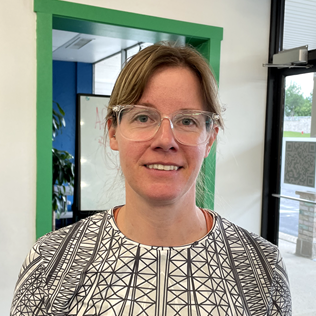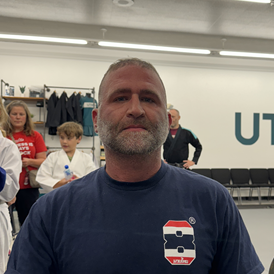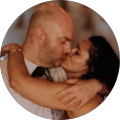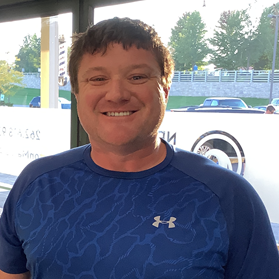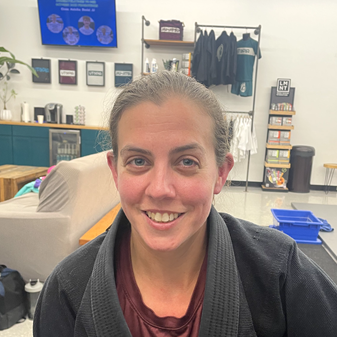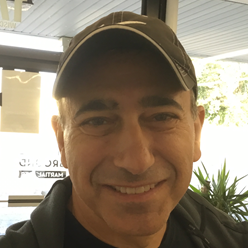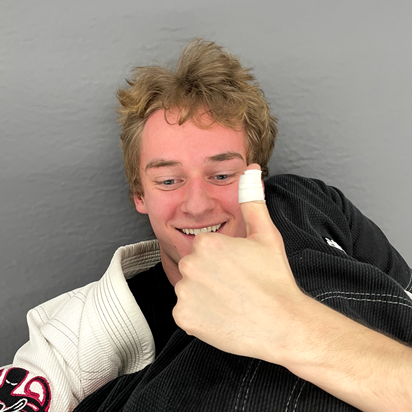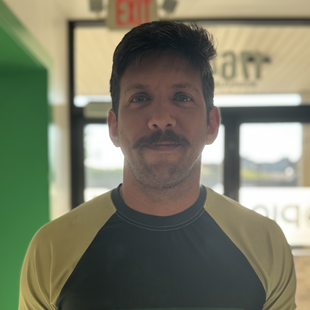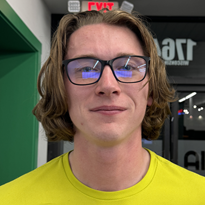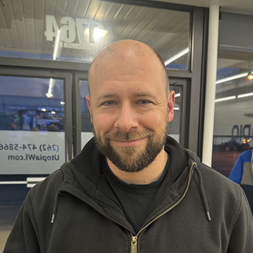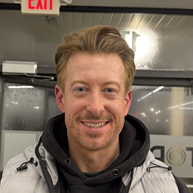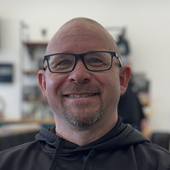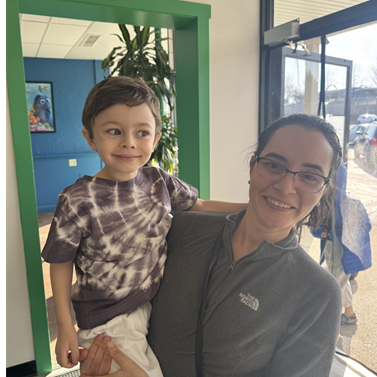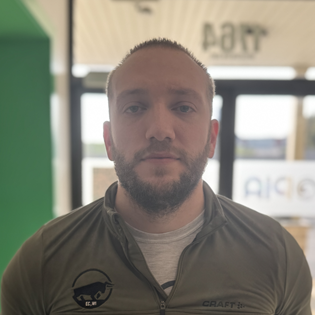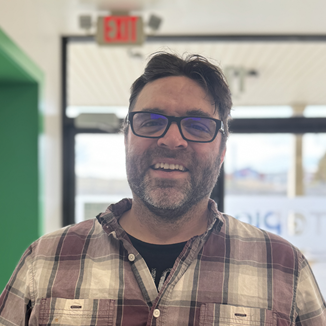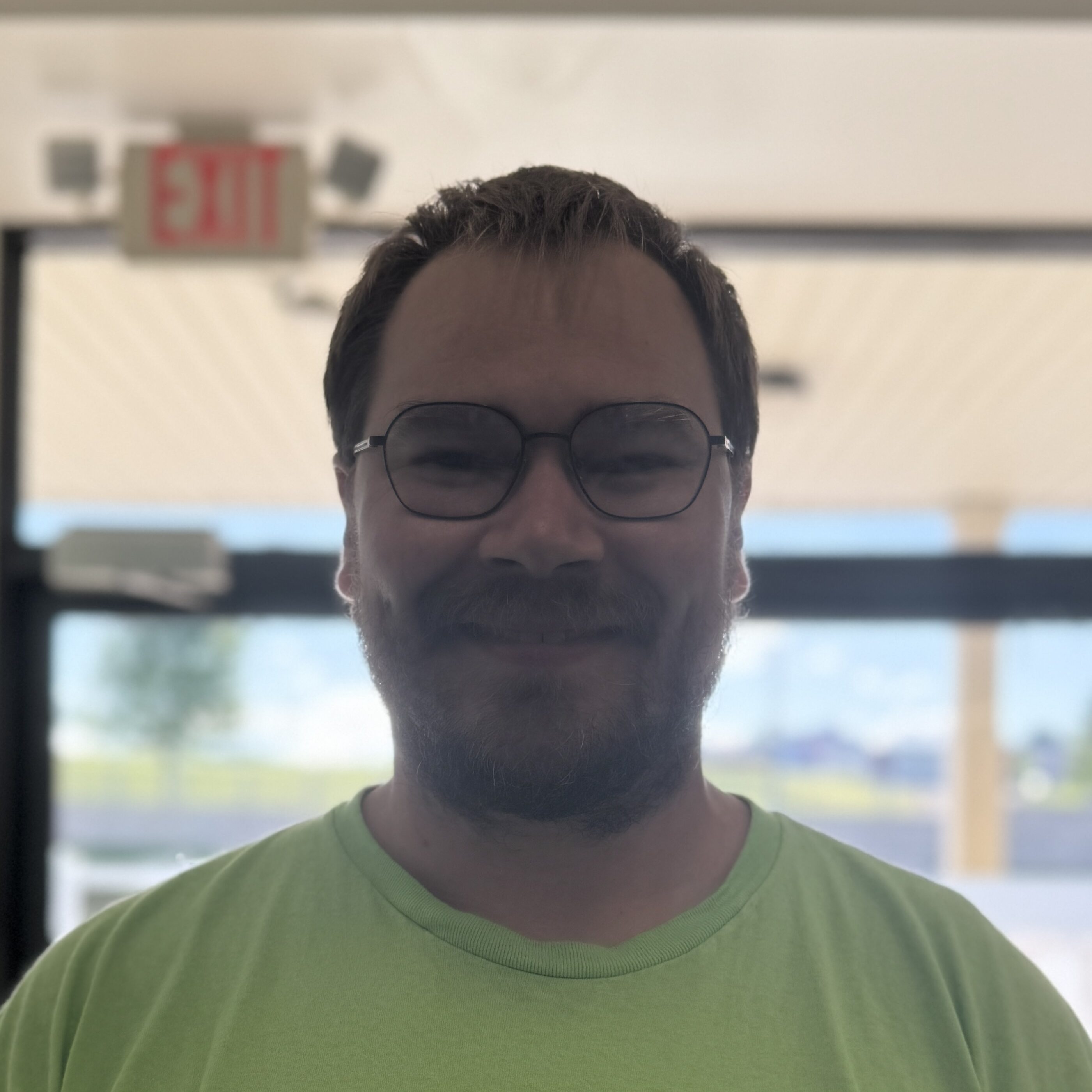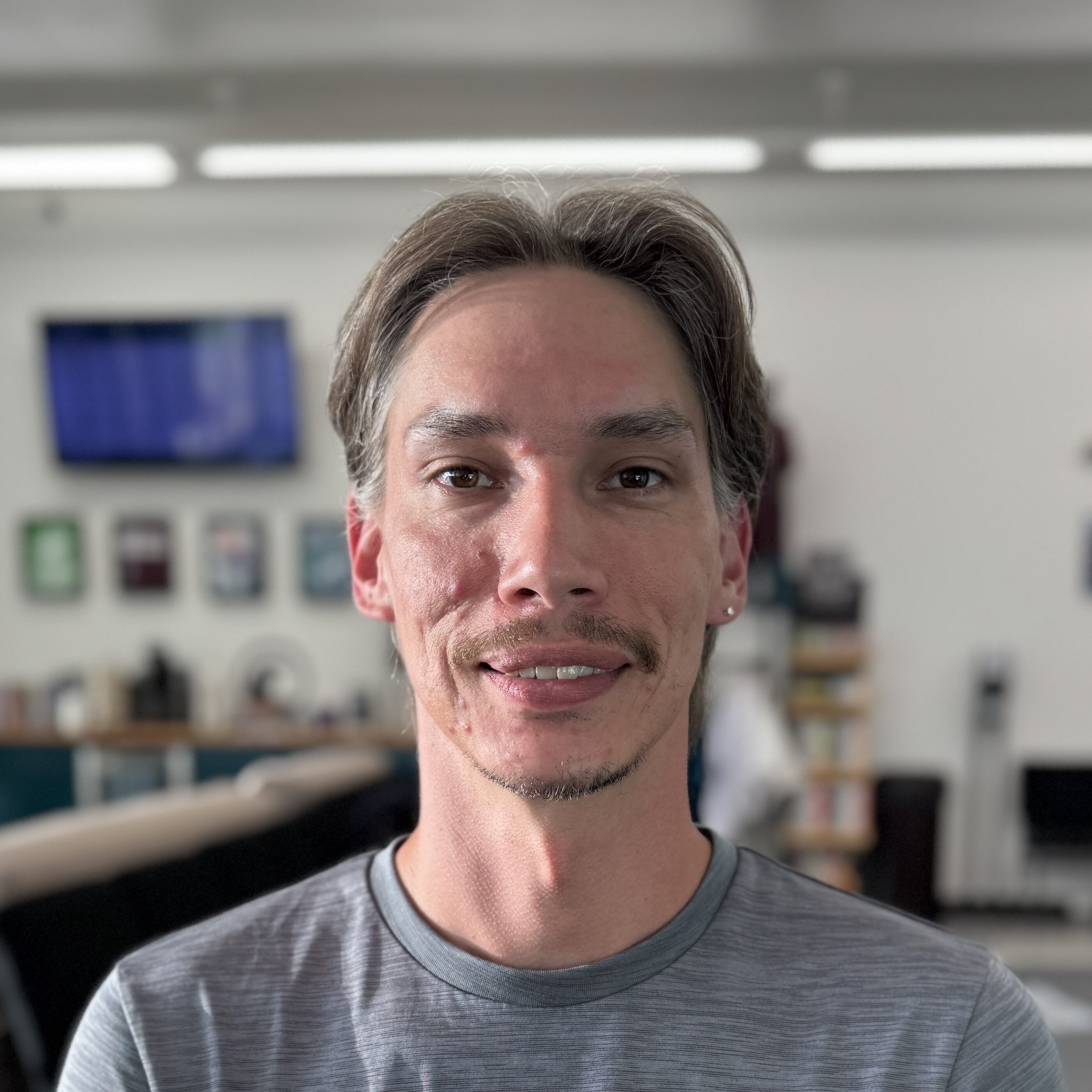In episode two of Inside the Wave podcast, the host sits down with special guest Jon Friedland, his jujitsu coach and mentor. Jon shares his journey into the world of martial arts, beginning with his inspiration from Royce Gracie’s performance in the early UFCs and reflecting on how martial arts, specifically jujitsu, have evolved since the late ’90s. He reminisces about the martial arts landscape before jujitsu’s rise to prominence, highlighting the popularity of arts like Kung Fu and Taekwondo during the Chuck Norris era. Jon also discusses the impact of the UFC in changing perceptions of martial arts effectiveness and how it served as a hook for many enthusiasts, including himself, to pursue jujitsu. Listeners get a glimpse into Jon’s personal background, including his time in Taekwondo before joining the military and how his martial arts journey unfolded from there. Join us for this insightful conversation that delves into the origins of a jujitsu journeyman and the transformation of martial arts over the decades.
About Jon Friedland
Jon Friedland is a figure of considerable influence and respect within the Brazilian Jiu-Jitsu (BJJ) community. He is the owner and founder of Neutral Ground Brazilian Jiu Jitsu. His journey into the martial art began in the late 90s, a time when the discipline was still burgeoning in the United States. Inspired by the legendary Royce Gracie’s performances in the early Ultimate Fighting Championship (UFC) events, Jon embarked on a path that would not only shape his life but also the lives of countless students he would go on to mentor.
Jon’s initial foray into martial arts was through Taekwondo, where he achieved a black belt—a testament to his dedication and passion for combat sports. However, his transition to the military would introduce him to the rigors and the discipline that would later define his approach to BJJ. It was during his service, stationed in Germany, that Jon and a friend began their self-taught BJJ journey, using VHS tapes of the Gracie family as their guide. This unconventional start laid the foundation for what would become a lifelong commitment to the art.
Upon returning to the United States, Jon’s passion for BJJ only intensified. He sought out training wherever he could, eventually leading him to establish his own academies. His dedication to the sport is evident in his willingness to travel extensively, seeking knowledge and experience from various sources, and then bringing that knowledge back to his students in Wisconsin. Jon’s ethos as a coach and mentor is deeply rooted in the belief that martial arts, particularly BJJ, offer more than just physical training—they are a conduit for personal growth, resilience, and empowerment.
Jon’s competitive spirit also led him to a successful career in mixed martial arts (MMA), where he amassed over 30 fights, competing internationally and gaining a wealth of experience that he would later impart to his students. His MMA career, while marked by victories and defeats, taught him invaluable lessons about the importance of teamwork, individual responsibility, and the profound impact of a supportive community.
As an instructor, Jon’s philosophy extends beyond the mats. He emphasizes the importance of fun, safety, and character development, particularly when teaching children. He believes that the principles learned through BJJ can be applied to all areas of life, helping individuals navigate complex situations with the same strategic mindset they would use in a sparring session.
Today, Jon Friedland stands as a testament to the transformative power of Brazilian Jiu-Jitsu. His achievements are not just measured in belts or titles, but in the thriving community he has built and the positive influence he has had on his students’ lives. Through his academies, Jon continues to spread the art of BJJ, fostering an environment where every individual can discover their potential, both on and off the mats.
Transcript:
Perry Wirth: Welcome to Inside the Wave podcast, episode two. And today I have my jujitsu coach, my mentor, Jon Friedland joining us. Welcome, Jon. Happy to be here. To the podcast. You’re as much my coach as I am yours. I appreciate that. So tell me a little bit about you. You’ve been doing jujitsu for a minute or two. You have a academy or two. Let us know a little bit about you.
Jon Friedland: Well, I started jiu-jitsu in the late 90s, right? So, like most people at that time, inspired by the Royce Gracie performances in the first UFCs.
Perry Wirth: And you didn’t really start in the 80s because it didn’t even exist in the U.S. yet.
Jon Friedland: Right. But you’re right. What was neat about those, martial arts did. So like, that was like the, the Chuck Norris era and then all that. And, and then like the, the, the fantasy, other Asian arts, like Kung Fu, like these mystic things, like Kung Fu and then of course, Taekwondo. And I was a Taekwondo and all that, like everybody else at the time. And that’s what made us look at the UFC when it came out a little differently than regular people, I think, because we always theoretically thought, oh, Kung Fu is better than Sumo, better than Karate, better than Jiu-Jitsu. We’ve heard of Jiu-Jitsu, of course, but to see it put to the test opened our eyes a little differently than, I guess, the lay person that watched the first UFC. So I think we had that slight little advantage or at least different way of looking at it, and it hooked everybody. Everybody that you know has been doing Jiu-Jitsu from that era, that was the hook.
Perry Wirth: So did you discover Jiu-Jitsu For one, Taekwondo. What rank were you? You know what’s ridiculous?
Jon Friedland: It’d be the spite of the military. I think this is absolutely hilarious. I had just tested for my black belt right before I quit my Pizza Hut job to join the military. I received my black belt in the mail while in basic training in Georgia, which doesn’t sound like a big deal, but there you give up all your rights. They read your mail in front of everybody. They open your packages. They take your food, all your care packages, all the stuff. You were only like high fives. It was not, it was like, Oh, what is this? What is this? I’m like, Oh no. So then I’m the bane of everyone’s joke. Cause I still can’t fight. Yeah. And then, uh, And so that, that was, uh, I mean, anybody that’s in the military, if you could just imagine that your drill sergeant pulled out a black felt of like the skinniest guy in the platoon pulls in front of everybody. I mean, as, as horrifying as it was at the time, I’m glad it happened.
Perry Wirth: Awesome. And is that before or after you found jujitsu? It was before. Okay.
Jon Friedland: Uh, I, so, you know, I joined the military in the, in 94, 93 technically, but it was, the UFC was I think 93 or 92 or something. It was early nineties. We saw it and it was just like, jujitsu, okay, jujitsu, man, this little guy, dragging the energy out of everybody and tying them up and mysteriously making them quit with this tapping out action. Yeah. You know, and it was, it just planted the seed where it was like, okay, Jiu-Jitsu seems to be the one that just no matter if they came in striking, swinging, or even grappling, it always came up ahead. So me getting beat up in the military later, I flashed back. I’m like, what can I possibly do? This is stupid. These guys are all bigger, just like you would expect. They all did some wrestling or they did better karate or whatever. Yeah. And I just remember flashing back to this, that Royce Gracie guy. Yeah. You know what I mean? So then shortly after I got in and stationed in Germany, me and my buddy who had a similar story, just started privately trading under the tutelage of Hoist and Hori and Gracie with a VHS tape in our barracks. When everyone else was out doing their Friday night shenanigans, we were there hiding.
Perry Wirth: Just practicing. Yeah.
Jon Friedland: And that was, You know, like all the martial arts can be empowering, right? But nothing was more empowering to me and probably ever since then, always being on the bottom, always being the victim of bullying. always losing every challenge I ever made and definitely every one I ever accepted just suddenly and almost overnight, realistically a few months, but it felt like overnight. We just stopped losing. No, we didn’t win all of our fights. We stopped losing. And like, when you’re no longer afraid your capital is going to be taken. you’re more likely to move on theirs. And it just, it was so, it was so, and I just, that’s, I think that’s one of the first and quickest gifts you get in jujitsu or any, you know, realistic applied fighting art is, um, the, the, the, how quickly you go from, the 99% to the 1%.
Perry Wirth: And I think sometimes, like, you don’t have to always win. Sometimes, like, surviving is thriving, right? Like, a kid’s getting bullied in school. You don’t have to beat up the bully, but if you show the bully that what they’re doing to you is not effective, that is a victory. That’s sometimes a larger victory.
Jon Friedland: And a service to every other kid, too, 100%. And so, you know, self-defense is, sure, you’re defending yourself, but you’re also defending everyone else. Yeah. because you’re willing to put yourself in a situation where I’m going to show you that your bullying isn’t working and then you just saved everybody else too.
Perry Wirth: So you found jiu-jitsu in the military, training in like the super classic Gracie like garage gym kind of where you’re just like all self-discovery, all self-learning, no real instructor besides Mr. V, Sensei VHS. Yeah. If you guys don’t know what VHS is, it’s before DVDs, which is before Netflix. What does VHS stand for? I couldn’t even.
Jon Friedland: Because I remember it was VHS and beta were the two competing things, I think. What is it? I don’t know. But, but, uh, it was, yeah, they’re big and ugly. Any of the first video tapes, yeah. Back when we were training too, people would try to record us. Not enough, unfortunately, but they would stick those big VHS tapes in a bigger thing. Oh yeah, yeah, yeah. And it was nuts. So they had smaller tapes, so they evolved that way. Now the phones are super, super nice, but so sorry.
Perry Wirth: So then, so you found jujitsu in the army. You kept practicing jujitsu. You did your services, your tours. And you eventually came back to Wisconsin, right? Yes. Okay.
Jon Friedland: When was that? So that was cool. So I got back, holy God, at the end of 96, early 97. Jumped right in the university. I wanted to get a quick transition back to Green Bay where I was. And I was just raving. I told everyone I could tell my family. Nope. When you start Jujitsu, you want to tell everybody and no one wants to hear it. You know what I mean? There’s like a crossfit. There’s some advice for a new person. It’s saying exactly, it’s crossfit. We’re really kind of, but Jujitsu is so abstract. Oh yeah.
Perry Wirth: Nobody wants to hear it. Especially if they see it, they’re like, and what are those two guys doing? It’s so, it’s so, yeah.
Jon Friedland: So, but I was one of those, I was that guy. I went to that, I went to that, that face. I’m like telling everybody and they’re like, yeah. And. You know, he heard us do the Nintendo game, you know, or heard about the Green Bay Packers. And so, but one of my friends was paying attention and he said, he said, you know, I just saw, I heard a radio announcement about Brazilian Jiu-Jitsu. It’s as far away as Appleton, 30 minutes. Now, who wouldn’t give an hour now? But I’m like, it’s not the Jiu-Jitsu I’m talking about. This is just what we were talking about before we knew what Jiu-Jitsu was. And he’s like, I’ll go down there with you. whatever, he couldn’t do it at the last minute or whatever. So I drew it all by myself. And I went in there and I’m like, I’m just going to- From Green Bay to Appleton. Yeah, which is nothing. And that’s what, yeah. And I went in there and I saw a bunch of people in geese. Yeah. Doing exactly what I thought jiu-jitsu was, the new jiu-jitsu that I saw, Royce Gracie. Yeah. And it looked like the grainy, you know, you call this out, the garage jiu-jitsu stuff. Yeah, yeah, yeah. Real grainy, it just, it just, Big Midwestern guys roll around though. I was like, and the guy’s like, oh, how are you doing? I’m still little. Yeah. And I’m like, I want to sign up for this. Like, just try a free class first. Like, no, I want, what’s the maximum I can do right now? We could do six months or whatever. I’ll pay it full right now. Yeah. It’s like, you know, most people that do this don’t make it a week or two. I’m like, no, no. Think I’m all hers. Fact. Well, it’s still a fact, right? And I think it’s, and I think as a side note, I think it’s on us too as the leaders to try to soften that blow. A hundred percent. Right. Like to just widen that funnel of, like, give them a little bit of a treat. And even in your early days too, it wasn’t the most accepting environment, right? No. And, but I mean, and not to get off track too much, but like people don’t have to come in hard. Yeah. You can build resilience, you know, and we can, and we can, knowing that, but so back then it was like, you’re right. People don’t make it a week or two. Yeah.
Perry Wirth: Which we’ve actually, and I’ve seen you evolve. your curriculum in your gym, like you’ve removed some things from the warmups that are like super intimidating for newer people. The hard way you change stuff up to adapt, right? Because our goal, like we still want to create hard individuals and people that can defend themselves. We want to create a lot of them, not a few of them. And if you kind of like face everyone out, filter everyone out right away, they don’t get a fair shot at finding out if it’s for them or not.
Jon Friedland: Yeah, that’s right. And if steel truly hardened steel or iron sharp as iron, We need more of it. Yeah. And we both saw each other. It’s like, uh, I was using the analogy of like, um, like doing laundry or, or. I hate doing laundry. What about it? Imagine that person that loves doing laundry. I don’t see people, they actually, I should take it back because people do it as like meditation. It’s like, just like dishes, but laundry is one thing, but we’re like a rock and a tumbler. Do you remember what tumblers are? Are tumblers a thing? Yeah. What is it that makes it smooth? Shining? Yeah. Yeah. That thing will get smooth faster with more rocks. Yeah. The piece of clothing you try to get cleaner will be cleaner with other clothing bumping up against it. Yeah. You know, people wash it by itself. Careful, it won’t get as clean. But what? Also, if there’s too many rocks, nothing gets polished.
Perry Wirth: Yeah.
Jon Friedland: You know, we fight for mass space every day. Nobody can move. You have to take turns. And the same in the wash too. Yeah. So you’re welcome for the laundry too. But I mean, that’s, I think that’s a, you would have that perfect balance of, of contact and space. Yeah.
Perry Wirth: Right. So you did, you signed up for six months in Appleton. How many other like gyms were in the area in Wisconsin? Like night where it were like 96, 97. If there was any gyms at all.
Jon Friedland: And we have to look back at the history. There may have been one, it would have been Justin Morris probably, or maybe a Madison thing way back then. Everywhere else that we were training was either, like where I was even, where I was, it was just a side project at a karate.
Perry Wirth: Yeah, I was gonna say, it’s not a jujitsu. Yeah. Yeah, it’s like, hey, we’re a karate school and we saw a jujitsu dominant in the UFC, so we’re gonna practice some pajama. That was all of it, yep. Okay.
Jon Friedland: And so, or people’s bases. And that was the thing. On Friday nights, it was kind of like a tradition. We’d go way up into Door County, of all places. We’d go down to Milwaukee, of course, Madison, Beaver Dam, Appleton. And then I started venturing to Chicago, and then Atlanta, and LA, and New York. And I just tried to get That was like the days of like, you went on like exploratory missions and brought it back. Everybody was. So we were mixing it up. Like that’s how like the, the Melty Pot started, at least for us in Wisconsin.
Perry Wirth: Yeah. You know, and that’s crazy because you in 97, you had to go travel to find a jujitsu school. Even when I started in 2007, 10 years later, if I wanted to train with like a handful of color belts, like more than, more than one, you’d still have to travel for it.
Jon Friedland: Yeah. Cause it comes in phases, right? So to find anybody at all that wanted to train Jiu-Jitsu. Yeah. You had to, you had to travel an hour or more has time. And I remember one of the, one of the big concerns was like, how do I cover my rug burn? Not Matt Berg, but Rugbert. Half of us didn’t have mats, half of us didn’t have geese. We certainly didn’t have bells with tabs on them that we used to… Even in your early days, I believe my first belt was wrapped in… Yeah, like… It was… Not a lot of tape, bro.
Perry Wirth: Hockey tape.
Jon Friedland: Hockey tape, that’s it. We made our own tabs. We wanted to have, like, them. Yeah.
Perry Wirth: And I think the only way, and this is dating ourselves because e-commerce like wasn’t that baby thing, right? Go online and order it. Like if you wanted a jujitsu gi with a jujitsu belt, you bought it from a tournament. We’re like, oh yeah, we did vendors. We’re like Fuji was there as a vendor at a Naga tournament. That’s right. That’s right. Otherwise you’re just getting a judo gi or karate gi from Norm over at Judo Aiken. You would ride it back to the gym on your scooter.
Jon Friedland: I was just talking about this a couple of weeks ago. On my scooter with my army duffel bag, very symbolic to you, with my army duffel bag. And I remember hitting the gas. I had it loaded up with all our keys we could possibly have. Hitting the gas, maybe do an involuntary wheelie after we went through the intersection at the green light. People would tip me back. Yeah. I don’t miss that. I mean, I do actually. I’m nostalgic about it, but…
Perry Wirth: So you were a part of jujitsu pretty much since it started, at least in the United States. And he’s kind of seen its evolution. Um, and from my understanding, like, and with most athletics and cool things, right, they kind of start on the coast. They kind of move their way in, they’ll get to Chicago before they get to us. When did you start seeing jujitsu actually start becoming a thing in Wisconsin? Like where you can go like, Hey, there’s a jujitsu school, man. There’s a jujitsu. So like, man, was it Henry’s? Was Henry’s kind of player? Yeah.
Jon Friedland: So he, I’m sorry, man. I’m trying to think where the first place, cause we used to drive down and I, I could have the order messed up. Yeah. The order of the places, but like it was the brickyard gym, but before that there was, an old salon that I think is now a guitar store on Kinnick Kinnick and before that it was in a oh wait um at the corner of Lincoln and KK it’s now like a bake no no it’s it’s Voyager it’s a it’s a wine bar right now yeah um and so that was so I guess I mean that would have been oh man I don’t screw up the dates but I bet I’m just saying around 2000 I could be off by sure two or three years but The first person that showed me that having a jiu-jitsu school as like a profession, whereas everyone else was, everybody you knew, if they did have a school or the beginnings of a school. Also, let’s not forget about Adrian Serrano, too. Oh, let me, let me not. Oh, legend. Yeah, like, I mean, like, He’s got an amazing story and a million fights and super helpful to me.
Perry Wirth: Like legitimately a million fights. Well, over a hundred, I think. I know for a while.
Jon Friedland: Documented. Yeah. I know for a while he was like the top five, at least, of number of MMA fights or whatever. Yeah. But it’s just another one too. And then he was in the back, kind of a side project or a side program, I should say, at Duke Rufus Gym or whatever. Then he starts to get popular and then they need their space. So then things kind of happen like that. But back to Justin Morris, he was the guy that… I heard that he quit his job. What are you going to do? How are you going to keep the dojo? He’s like, the dojo is going to keep itself. Kind of thing. He didn’t say those words, but like he, I’m like, what’s your job is you just have a dojo? That doesn’t hurt. Yeah. He didn’t do that.
Perry Wirth: His head at the back of my mind is I was really in the jujitsu space. Yeah. Right. Like karate and taekwondo, like they found that down of, you know, how do you actually make it a career? And we could learn a couple of things.
Jon Friedland: 100%. But yeah, the jujitsu was just like, I’m going to get you. I’m going to fight you. I’m going to go back to my job. Yeah, we all have day jobs. Yeah. And so to make it your day job was really cool to watch him go through it. Because I remember him struggling to it and being open about it and having his jobs. And he’s still kicking butt, rocking it. Yeah. And so that, that was, and then, you know, things started popping up and they fizzle out, pop up, fizzle out, like quantum jujitsu for a while. Oh yeah. But then, you know, then you got, and there’s always something, I bet you new schools open it up every year. Not all the time. I welcome it. It’s such a.
Perry Wirth: The more, the better new ones open some split into two, some open up other locations, some close different angles. That’s true art, but it’s definitely not been like, it’s been fairly exponential growth, right? Like I don’t have a data scientist to analyze this, but it’s not like linear by any means. Like it’s, it’s blown up in the last, you know, 10 years to hear it.
Jon Friedland: overheard in conversation by people that don’t even practice it, is, you know, I would have never seen that coming. A hundred percent. And back in the day, just to even hear someone know what jujitsu was was uncommon. Now it’s like, well, I’m going to jujitsu you. That was never a thing. Yeah.
Perry Wirth: So I thought that, I think that’s pretty crazy. So what made you want to go from athlete to coach and from coach to gym owner? Athlete to coach to coach. Cause like you were just doing jujitsu for a while. And then I know that you were coaching at other people’s places, right? I know you were coaching at Rufus sport for a while. Um, helping out at other academies, kind of had your own little thing going on, but then you’re like, there was a moment in time where like, I’m going to open up my own place.
Jon Friedland: Yeah. So the, the, the first part of, of just, I just, I was young. I loved the empowering feeling. Like, like I mentioned of, of just. I won’t be a victim and no one around me will. And I’m gonna set the example. It was just a powerful, like they all wanted more of it. And I, and I, and then, you know, once you get past that 1% we’re kind of talking about, it’s like, I want to beat the other guys that can do jujitsu too. Like, and then, and it’s just, I fell in love with the first, I fell in love with the martial part of the martial art. Yeah. But the second and the most important part is falling in love with the art of it and Once I got obsessed with all the intricacies of it, all the variations of it. It never stops. It never stops. And that sounds intimidating if you’re still in the martial phase. Yeah. but exhilarating if you’re in the artist phase.
Perry Wirth: Yeah. And I love that concept because I tell people all the time when I’m talking to new students, like it’s like drinking from a firehouse, but we eventually learned to love drinking from the firehouse.
Jon Friedland: Yeah. Or, or how to just take it in doses. You push your whole mouth over.
Perry Wirth: Yeah. A hundred percent because like still go to a seminar that’s two hours long with someone and I’ll be like straight over my head. So much information. And I’ve been doing jujitsu for, I don’t even know how long now, but like 17 years. It’s funny the longer you do is a lesson, but like I still feel like this, but I love it now It’s it’s less intimidating. It’s more like every time that happens to me. I’m like, there’s still so much for me to learn I love it.
Jon Friedland: I think that’s a that’s it goes from intimidation to exhilaration And you’ll never feel never once you click over to that once you flip into that You’re a true artist you like just because you’re up a great potter doesn’t mean you won’t appreciate another painting gallery or musical performance. Like, art is art, and there’s no two that are the same. And even if you’re using the exact same colors, what are you going to do with those colors? We talk about this all the time, too. There’s some undeniable facts in the universe. In art, red and blue make purple. They make purple. That’s undeniable. You can’t fight that, right? You can’t get any more leverage. You can’t get any more torque on anything than 90 degrees. These are just, there’s certain unalienable rights, or not rights. But laws. Laws. We teach those early, right? And that’s, those are undeniable. But what you do with those, that’s the Perry of Jiu-Jitsu. Yeah. That’s the Jon of Jiu-Jitsu. That’s every single teammate we have. You make it your own. Yes. So if you’re still in that, I don’t understand the basics phase, well then there’s just too much to learn. Why would I do this? This is dumb. But if you show, look, there’s only a few principles. It’s a few things. There’s only certain ways you can mix colors. Mm-hmm. Once you get past that, then they’re like, wait, I can do this? Yeah. And we always say too, like, you know, when you’re a new person, answers are great. You’re looking for the answer. You’re looking for the keys. You’re looking for the answer, the plug and play. You know, you’re getting better at jujitsu when the answer is, well, it depends. Yeah.
Perry Wirth: That’s real life. Which is like almost always the answer in jujitsu. It is. The answer is like almost always it depends. Right. And there’s always multiple right answers. And as I’m the new guy, I won’t hear that though.
Jon Friedland: Yeah. You want the answer. Tell me what the answer is. How do you escape mount? They really do expect, and I don’t blame them. How do I get out of a mount position?
Perry Wirth: Okay, we use a couple tools. And I think that’s great for a new person because it gives them a singular target to aim for.
Jon Friedland: Just like checkers is good. Yeah. You have certain things that just… It’s easy. Black and white, good and evil, super bad, Lex Luthor. Real life is like jiu-jitsu.
Perry Wirth: Everything depends. Then you add in like chess, and then it’s another layer. And then you do whatever chess is on Star Trek, that 3D… Oh, yeah.
Jon Friedland: You know, I tried to make one of those boards, a homemade board. We swear, I just need to mark it as explicit.
Perry Wirth: Yeah, I mean, that was…
Jon Friedland: And then, but just like real life too, like when you’re a little kid, there’s good and evil. There’s black and white, literally all the pieces. Even in politics, there’s red and there’s blue and there’s, like I said, Superman likes Luther. Like, real life isn’t like this. It’s more Eastern, like the, yeah, man, you know, like.
Perry Wirth: Yeah. Like there’s all the in-between and that’s where all the magic.
Jon Friedland: And that’s where you have to be, you have to jujitsu your way through. That’s what I think one of the greatest benefits of jujitsu, all off the mats, is your ability to look at it more realistically than idealistically. What really is happening here? Just because there’s a hand in my collar doesn’t mean I’m in trouble, 100%.
Perry Wirth: It’s just there. It’s a fact. It’s not a threat. It’s not an opportunity. It’s just you can view it how you want to view it.
Jon Friedland: The classic, no way to hold them, no way to fold them, no way to run. But based on your data- No way to run? No way to run. We don’t run. Children of thieves run. No, but I think that’s one of the big things, too, is just that ability to zoom out and be like, oh, maybe what seemed right at the moment is wrong from the strategic picture and vice versa. I think I got all the idea. We’ll get down to the weeds, take a look. That zoom in, zoom out, I think that’s a powerful life lesson that I learned at Jiu-Jitsu. Yeah. Luckily, or maybe I would have learned it anyway doing underwater basket weaving. Yeah. But I started Jiu-Jitsu young enough that I think Jiu-Jitsu was the way.
Perry Wirth: You get to see like the micro picture and the macro.
Jon Friedland: Yeah. And I think it’s a life skill everywhere. Every time someone cuts you off in traffic, the classic examples, right?
Perry Wirth: Do you think maybe there’s more to your situation? One analogy I heard from one of my mentors about that is like, You know, I see things from my perspective, but then I need to be able to see things from your perspective. Then there’s this zoomed out global perspective. Like, hey, I’m not in my shoes. I’m not in your shoes, but I’m in the camera shoes right now, looking at everything that’s going on, the worldly perspective. The bird’s eye view. Yeah. Yeah. And jujitsu really gets you looking at things.
Jon Friedland: Well, and even in a literal interpretation of that, me and you are rolling, and you ask me a question. Well, wait, it depends. Am I you or are you me? Yeah. Or I’m watching you roll with somebody else. How do I advise you? As I stand out, like you said, I’m like the bird’s-eye view. It’s nice to have a bird’s-eye view. You see everything going on. Like it is. It’s nice to have a mentor, or a therapist, or something that looks over. Take away all your little feelings you got from your inside. Mm-hmm.
Perry Wirth: Mm-hmm. And just, how does this look to me out? Just, like, completely detached.
Jon Friedland: Yeah, and how would I be if I was acting this way? A hundred percent. Yeah. I like put yourself in the other shoes. Yeah. That takes wisdom gained through applied living. Yeah. Jiu jitsu has just sped up lives over and over again.
Perry Wirth: And so we talk a lot about jiu jitsu. I also don’t want to neglect that you had a pretty successful and long MMA career too. How many fights over 30? 32. 32 fights. All over as well. Russia, fights in Russia. You never ended up fighting in Japan, did you?
Jon Friedland: No, I did two combat wrestling things. One of them, I guess, for Minosato. Okay.
Perry Wirth: 99 or 97. So what made you want to get into MMA and why?
Jon Friedland: I never wanted to get into MMA. 30 fights later. So one of the beautiful things about starting jujitsu at the cusp of it when it started was that we were doing it before it was cool, you know?
Perry Wirth: You could kind of just do MMA, but just do your jujitsu and still win. Yes. Where MMA was still different martial arts against martial arts. It wasn’t like well-rounded
Jon Friedland: was just tough and they could fight. Yeah. But jujitsu, even, even wrestlers would just, they, they could only wrestle. So there, the wrestling wasn’t as effective early on. Yeah.
Perry Wirth: When they learned how to, when they throw in a little bit of jujitsu, then it gets really effective. Yeah.
Jon Friedland: Well, they, they brought it, they brought us the ground and pound and lay and pray and all that. Like, but I mean, each of the Heather influences, right.
Perry Wirth: But yeah. What’s the biggest lesson you learned from them than they. Maybe life, maybe jujitsu.
Jon Friedland: Biggest lesson from MMA? Yeah.
Perry Wirth: Like what’s your takeaway that you could give me from MMA so I don’t have to do it myself?
Jon Friedland: Oh, yeah. Well, MMA is just another, uh, I think MMA is just like jujitsu. It’s just like other things. Like you get out of it what you put into it. There’s some guys that got out of the MMA thinking, well, if I could have just, Ooh, that guy, I wish I could have, but it taught me like, you know, Life is a team sport, but you are fully responsible for what you put into it and out of it. And when you’re in that cage, it closes behind you and you are by yourself, even though you’re part of a big team. Yeah. And you have a corner van. And one without the other is impossible. You can’t do what you’re about to do win or lose in that cage without the support and backing of the team that’s part of your tribe, right? Yeah. And the tribe fails without the individual efforts of each one within it. And MMA brings that to light. One of my favorite memories of MMA was actually one of my most embarrassing, humiliating, quickest losses. All of them. Actually, you were there. I was gonna say, was I cornering you? I hope not. It wasn’t your fault, Des. Because again, it was on me. It was one of those… I don’t believe in luck, but… I got just cleaned right in the first seconds of the first fight, probably 22 seconds.
Perry Wirth: All it takes is one good punch and sometimes people don’t realize that. Yeah.
Jon Friedland: That’s what they call the striker’s dice roll or whatever. But I remember my, you mentioned Star Trek, my legs going in and out, in and out as I was going. I remember his leg against my face as I’m trying to take him down and be sprawling and hammering and hammering and hammering. And then I’d up the ice cold for good.
Perry Wirth: Is that when you got punched going, like you got punched and you’d come fall, you got knocked out on your way to a double leg and then walk back on the siding? Yes.
Jon Friedland: Or I don’t even remember that fight. And try to tackle the referee when I came to. Yeah. Who was Al Wickers? Oh, Al Wickers. Yeah, that’s right. Uh, let legend, let’s ask legend Jeffery. He’s probably ref more matches than anybody on Earth here. But, um, but so I I’m blacking out. I’m actually out that with that wake up and they’re like, what’s going on? And I remember. Pucci said, what do we do? What do we do? And I’m like, get me to my feet. I don’t know. And then we, you know, we got this for the belt. So we made sure the guy won the belt over me. And then I was so, uh, uh, so just humiliated and yeah, that’s on me. Right. Humiliation is a choice. Yeah. I just, I just couldn’t, I couldn’t deal with the emotional whatever. And I remember going back to the locker room and you could just feel the crowd and just like, But here’s the thing, this is back to the old, it takes a team. Even though I fought with myself, I’m sitting there and I’m crying. I’m sitting on a chair and I got tears running down my face. My, my, my glumped hands are over my face. I’m like, what did you, what the, what the hell did you just, you know, really beat myself up. And one of you guys are tapping me on the head saying, Hey, oh, the doc, the ring doctor wants to see you and make sure you’re okay or whatever. I just, I’m like, I’m like, why? I look up and you guys have a freaking cocoon built around me. Yeah. It was like, we rehearsed this and it’s like, Oh, let him in. He opens up like a, like a cocoon action like that. And it lets him in, you guys close around to him. He said, you guys are protecting me from whatever. And nobody’s getting to me with, with all my, it was really, really. And then it was again, that Duke Rufus himself, the promoter of the thing comes in like, Hey, you okay? I’m like, I’m so sorry. He’s like, you did great, man. This happens any given Sunday. So he’s real support. But you guys opened up and closed around me like this. We never had a contingency formula. Right. So that’s not us, but to, to watch the way you guys came together, it was one of my favorite, proudest moments, uh, well in my life, but in MMA and certainly Jiu Jitsu and the whole journey was because like, I’m part of that. If I saw that from the bird’s eye view, watch how they cocooned over that guy. Yeah. That guy happens to be Jon or whatever. And they just- True team and family. Yeah. You guys didn’t have a plan. You guys didn’t know what to do, but you knew it would protect him. Yeah. And he’s one of us and he would do the same for us. I just, I, and that really like, it gives me chills thinking about it right now. For sure. And so talking about, I could have had just that one fight and not done 31 others. Yeah. But I, I really took that as a really, it made me feel like my purpose in Jiu-Jitsu is proper. And like, cause it is bigger than a fight. Yeah.
Perry Wirth: So now at this point in time in your career, you have all those fights on your belt. You have a lot of years of training, a lot of traveling jujitsu. Oh yeah. Um, you have two academies, you have your kids in jujitsu now. Yeah. Uh, For the parents out there, what’s like your, what’s your biggest tip coming from a person that’s been doing Jiu-Jitsu for so long and owns academies? What’s your biggest tip for parents around getting their kids involved in Jiu-Jitsu? Especially if you like, really want them to do it.
Jon Friedland: This is a sore subject for me because it’s a hard one. I’ll tell you, I’ll tell you why I’m going to nail this answer though. Cause I screwed up with the first and succeeded with the second. I screwed up initially. I learned from the mistake of the first. Yeah. But, um, It’s just play. It’s just another game. And, you know, it’s all stuff that we all should know better. Just, it’s like baseball or football. This is just jujitsu. You get to wear karate pants, karate outfit and just play, play, play. It’s fun. And yeah, there’s no reason unless somebody’s in danger. Yeah. Like we’ve already got kind of a four ten star kids program. Like number one, keep it safe. If all, if everything is gone haywire, just keep, you’re there. Right. Always on board. Right. Uh, and then number two, before character development, before A tactical prowess is keep them having fun, because if they don’t have fun, they’re never going to be able to work on their character or their… And that’s what I stay with, that they’re going to want to quit right away. So in that order, you go in there thinking, I’m going to teach you how to do an armbar or pass the guard or take somebody down, but what’s more important than that is, hey, who’s being a turd? Like this is how you light up, you respect your instructors and communicate and control your emotions and try to… then, hell, have fun.
Perry Wirth: And let’s be honest, there’s no difference between that perspective that we should have for our kids and adults. It’s true. Like adults, it needs to be safety and fun. Like if you joined Jiu Jitsu and you want to learn how to beat other people, but it needs to be fun. Yeah. It’s, it’s, it’s even, and losing can be fun, but you have to find a way to make it fun. It is. And it takes a lot of, uh,
Jon Friedland: A paradigm shift, right? Yeah. Because what does it mean to lose? It just means that person had their hand raised. I’ve seen people get greater victories out of their losses, and some people lose worse with the wins. And in the same way, I’ve been more physically damaged by victories sometimes. I’ve gone out with the worst for wear. And that’s a physical example of what could actually be a spiritual or emotional or, you know, you can lose with a win and win with a lot.
Perry Wirth: Yeah. So a lot of times those one hit knockouts are the safest. Yeah. It’s the one that takes 30 hits that really damages. Yeah.
Jon Friedland: Well, that’s why I’d rather be at a bare knuckle fight than an MMA fight, an MMA fight over a boxing fight.
Perry Wirth: Yeah.
Jon Friedland: I don’t want to get in a pillow fight where I get 100, hit 200 pounds, 200 times in the head. I’d rather get one clean one here that might open me, but I’m okay.
Perry Wirth: So main message is just keep it fun, safe. Oh yeah, so fun in that order. Yeah. And then everything else comes based on that. Yeah.
Jon Friedland: Because then you start slipping with your, what’s neat about jujitsu as opposed to adults, what’s not as neat about adults too is as soon as you sneak the jujitsu in.
Perry Wirth: Yeah. Right. And, and I’ve been telling a lot of my, my blue belts that lately, cause they get to move out. They’re like, what now? And I’m like, find something fun to work on. Yeah. Find a position, find a concept, find a, a sequence that like, you’re not doing it to win jujitsu and you’re just doing it because you find it fun. Yeah. Like you need to find fun again. I think that’s why a lot of times people get the blue belt blues. Yeah. Right. It’s because they put all that work in to get their blue belt and then they keep putting that work in and they start getting burnt out. It’s like, no, you need to start having fun again.
Jon Friedland: That white to blue belt we just talked about this last night, uh, after class. the white to blue belt, and kind of talking about the blue and through, what do you call the blue blues? Blue belt blues. Blue belt blues, yeah, for sure. And I think one causes the other. The blues cause the, we have, there’s such a, it’s still the majority stay, right? But when someone gets a blue and they’re through, I think it’s, you’re like that seed under the soil and you’re just getting watered. And when you’re a white belt, you’re just getting watered. It’s like, I just got taken that information is a little bit of water. That’s some warm soil. That’s the nutrients of the soil. But once you are blue belt, you sprout and you’ve got leaves sticking out of you like this. There’s a lot of pressure, literally pressure, air pressure and wind in the form of, Oh, you got a blue belt now? If I get a blue belt, that means I have to hammer you. Yeah. Or I’m a purple builder, brown builder, like I’m going to put you to the test. You have all these extra stressors now because you are exposed to direct sunlight and wind and cold and animals. Yeah, yeah, yeah. It’s like, I, that’s what leaps them to purple is if they can weather those storms and use them. This sunlight’s not going to burn my leaves. It’s going to grow them. This rain is not going to flood us. It’s going to nurture us. And purple will try to rip my head off. That’s a compliment to me. That just means I’m trying to do that. It’s so like. We have to almost let them know, here it comes. Now with your blue belt, you have all this new exposure that you weren’t to before. You’re no longer protected by the soil, at least the visual. So I think that’s part of the blues of the blues.
Perry Wirth: What’s your trick to balancing everything that you have going on between owning two academies, teaching classes, training for yourself? You have your kids. You have your kids doing classes. You have a pond and a cold plunge in your backyard. You’re making your own yogurt now. Like how do you, how do you balance all this as a school owner, as someone who’s doing their own athletic training to a parent? Um, unlike. By saying no. That’s my favorite. Is it? I love saying no.
Jon Friedland: Yeah. No, is it really hard to do at first? Yes. Because here’s the thing. Successful people know how to say yes. very successful in order to say no. You’re not going to get anywhere if you don’t have the bravery to say yes to opportunities when they come, or yes to yourself, I can do this. But that only gets you so far until you have the ultimate bravery to say no, because every time you say no, you have the option of saying yes to other things, but every time you say yes, you don’t have any other options. I looked at the, what’s the phrase? No is a complete sentence, and yes is an obligation. That’s true. And so I, because of that, every time I have a new endeavor, a new adventure, a new whatever, oh, is your life harder now? Is it harder now? It’s actually easier because if it doesn’t fill into my categories of my life that are important, most important to me, they just, they’re just not, I don’t feed them so they die.
Perry Wirth: And sometimes no doesn’t have to be no. It could be not right now. Yeah. Right. It’s like, it’s a superpower being able to do that.
Jon Friedland: It is. And it’s, it shouldn’t be your knee jerk. Yeah. I think, you know, but if you’re, if you’re, if you’re 20 years old or 21 or even 70 and you haven’t whipped it out yet, say yes then. Say yes to just about everything. Yeah. But as you start getting constricted, as, as the fronts start to, Now you got to pick, okay, which one, you know, you got to explore it out. You have to get something, but then you got to start shielding up too.
Perry Wirth: What do you look forward to the most from like today onwards, right? You have your, you have your two academies, you have a ton of students, you have your association, you have your kids doing Jiu Jitsu. What are you looking forward to the most in your Jiu Jitsu journey, like moving forward? What, what really excites you?
Jon Friedland: I just, going forward with Jiu-Jitsu, I just like seeing all, what it’s done for my life, Jiu-Jitsu specifically, to see others using Jiu-Jitsu in different directions, but still using Jiu-Jitsu and the foundational concepts of Jiu-Jitsu on and off the mat. It inspires me. I want to see, I want to see what art they come up with. Yeah. Literally or figuratively, like I love watching, again, like I always fall back on it for I’m getting through stuff in my life and, and just really trying to thrive with, with these concepts to see other people doing that and having a part of that is so fulfilling. So, so like, like emotionally fulfilling to me, like it, like just it completely like gives me that like thing that I think a lot of us are missing and that’s a job. that you have passion for because you don’t have service, it matters. You matter. Like, and if I could be of any service to any of them, I don’t want to give up. I can’t give up. Yeah.
Perry Wirth: Like, you know, like because you make a difference. Yes. And it’s not in you. It’s. the jujitsu that you’re sharing with us. You’re almost just opening their idea, their brain to there’s more out there. There’s other perspectives.
Jon Friedland: There’s ways that they- And they do it to me too. They do it right back. A hundred percent. So like every time you go inside every black belt, there’s a white belt. Every white belt is a black belt to be at, right? Every time I’m exposed to another person that may have helped with jujitsu, they’re exposing me to some other thing I’m learning from them with.
Perry Wirth: And I tell my students this all the time, but I have this thing around. Anytime I help someone else with their goals, they help me with my own. So the more people I can help, the more help I give in return. If I don’t help anyone, then I’m flying solo. That’s true.
Jon Friedland: What do they say about… If you want to go fast, go alone. Yeah. If you want to go far, go together. I like that. Yeah, that’s awesome.
Perry Wirth: You’re just like a little book of quotes.
Jon Friedland: Quotes matter to me. I wake up with a quote. I don’t know. Yeah, it’s cheesy and they’re cliche, but they’re cliche for me.
Perry Wirth: I’m going to hit you up with 10 rapid fire questions. Oh. They might not be super rapid fire, but we’ll close with this. Do I have a time limit for each one? No. Gear doggie. Right now, at this point in time.
Jon Friedland: I do more gi, but I’m way more into no-gi right now. Because of the consequences.
Perry Wirth: I love it. What are you currently working on in your Jiu-Jitsu gang?
Jon Friedland: For me personally? Yeah. Or for… For… This timer! The best way to describe it is, I guess I haven’t described it in words, like looking at a position that we’re in, so the technical position we’re in, and how from another angle that might be just one hip switch away from a different position.
Perry Wirth: Like, for example, like- Like the global perspective we were just talking about.
Jon Friedland: Yeah, zooming out from the outside and being like, what’s the classic humorous one? In space, the mount is also the guard. Yeah. Almost like that, but with a little bit more complicated positions.
Perry Wirth: I love it. Cool. Favorite submission of the moment? The one they give me. Top person you would love to train with given the opportunity? Alive or dead, doesn’t matter.
Jon Friedland: Alive or dead? Both of my kids from their black belts.
Perry Wirth: Oh, very cool. Best advice for beginners?
Jon Friedland: Take off the street belt and put on the white belt if that’s where you are in your stage and trust the process. It’s it, there’s a lot being thrown at you. Listen or don’t listen. Just keep coming back. Just keep just twice a week, making your goal. Any more, you may burn out any less. You may fall out. Trust the process. A lot of this thinking has been done for you. You don’t have to be a master of anything. Everybody in that room was you once and just have faith in that.
Perry Wirth: One word to describe your Jiu Jitsu style. Fumbly. That was me last night.
Jon Friedland: I bet. I had those days. I would say in progress. Well, that’s two words. Evolving.
Perry Wirth: Oh, love it. What’s the toughest aspect of Jiu-Jitsu to master?
Jon Friedland: We almost talked about it before, or we were kind of talking about it before. I think the toughest part of Jiu-Jitsu is learning how to turn obstacles into advantages and failures or losses into wins. But it’s also the most beautiful thing you get out of it, right?
Perry Wirth: What’s one habit that has significantly improved your life?
Jon Friedland: Could be saying no. Saying no is a good one. The most up before the enemy. I, I, I, it’s like being an early riser. Yes. And it doesn’t necessarily be in the morning, but be ready before anything. So to be like third shifters, for example, not, I just, for me, it works. I need to be up well before my kids are.
Perry Wirth: And I know one thing that you always told me in Jiu Jitsu, you’re always the first person off the mat. Like whether you win, you lose, you’re the first person to stand up.
Jon Friedland: Oh, yes.
Perry Wirth: I thought I was off the map. Like, wait, what do you mean? No, not off the map, but like when you’re on the ground and you reset, like you are up before that, your opponent.
Jon Friedland: You remember. Yeah. I still try to be. Yeah. That’s a, if you don’t know what that is, you know, right. Okay. All right. We’re all down. Okay. Everybody get up. Try to be the first one up. Yeah. Just up for your own mental resilience.
Perry Wirth: What’s one habit that has successfully improved, significantly improved your jujitsu?
Jon Friedland: didn’t have passing it on. I see this too. I’ve watched it with my own children, but even with white, blue, purple, any belt, when they are helping somebody else out with something they need, their jujitsu goes up.
Perry Wirth: And last one. I know you have a lot of these. Favorite book.
Jon Friedland: Favorite book. That sucks because that depends on the audience. I love this audience. this audience, which is basically anybody interested in Jiu-Jitsu? Yeah, or doing Jiu-Jitsu. Oh, no. Oh, man.
Perry Wirth: Can you give me your top three?
Jon Friedland: It’s gonna make it easier. Let me tell you. Here’s what grabs me, what I return to the most. Okay. Marcus Aurelius’ Meditations. Everybody knows that one. That’s a classic, right? He’s like my ultimate advisor. Even though it’s written weird and everything, but meditation is always—we’ll say that. That’s a good one to start with. Any of the letters of Seneca that he’s writing to his Lucilius. Awesome.
Perry Wirth: I like the kind of old Greek and Roman. I haven’t read meditation specifically, but I’ve done the Daily Stoic, which brings in information from… Both.
Jon Friedland: Anything by Ryan Holiday, the author of that, he has good stuff too. And what’s nice about him, I actually should probably recommend those. The Obstacle is the Way, how about that? Yeah.
Perry Wirth: Or Diego was the enemy. He’s a good job at breaking down the verbiage. He will make Marcus Aurelius fun.
Jon Friedland: Yeah. He’ll make Marcus Aurelius fun again. That’d be a good, uh, yeah. Anything by Ryan Holiday, I guess, would be, cause he’s a good gateway. And then once you fall in love with all that and you want to go deeper, then you go look at, uh, Epictetus and Seneca and Chrysippus and Plato.
Perry Wirth: Yeah. Well, that was it, man. Anything else you’d like to share with the, uh, Inside the Wave audience, your students, your jujitsu family, your community?
Jon Friedland: No, just if you’re not on the journey, give it a shot. Give it at least four seasons. And I mean four seasons like of a year, four seasons of your jujitsu development, ups and downs. Give it a shot. Stay the course. Trust the process. Pass it on. And just
Perry Wirth: You’re welcome. Well, it’s been awesome. I appreciate you. I want to thank you personally for being my coach and helping me on this journey. You know, you didn’t bring the energy to, but you’ve kept me in it and you’ve supported me with everything I’ve done along the way. Back at you. I’ve learned so much from you including this. So thanks for checking in. Thank you, Jon Friedland. Uh, subscribe to this, like this, share this. We love you guys. Thank you so much.




















